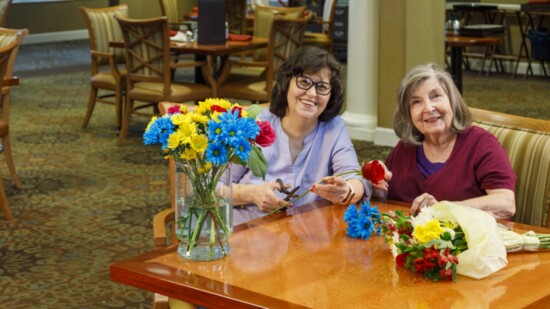We’re entering the season when adult children might notice that their parents aren’t quite as nimble or acute as they were a year ago. It can be stressful when the realization sets in that the time has arrived for your parents to move to a senior living community. While safety and care are always top priorities, these days providers place an emphasis on service, hospitality and amenities. That’s evident in Bellevue which has seen an influx of new construction in recent years. Recently we met with leaders of three prominent properties–Marshall Ussery, Administrator at NHC Place at The Trace; Jake Rightmyer, Executive Director at Harmony at Bellevue; and Stephany Powell Peugeot, Director of Sales and Marketing at The Village at Bellevue–to see what insights they have to share.
Everyone misplaces or forgets things, so, how do adult children determine whether their mom’s or dad’s actions are “the usual” or if they are experiencing a decline in function that needs to be addressed?
Rightmyer: We have a saying in our line of work that goes something like this: “It’s one thing to lose your keys, it’s another to forget what keys do.” It acknowledges the fact that when cognitive issues grow to a level where our loved ones don’t remember core functions, that’s when intervention needs to take place.
Peugeot: A mini cognitive assessment can go a long way toward determining whether someone is simply forgetful or if something more significant needs to be addressed.
With the holidays approaching, are there certain indicators we should be aware of?
Ussery: It’s important to monitor the general order of the household. Do they have supplies or provisions on hand that are necessary for everyday living? Also, take note of forgetfulness. Do they know how to get to the grocery store or are they forgetting their loved one’s names?
Rightmyer: Watch for clues of irregularity. If you know your loved one is generally a tidy person, but now the house is disheveled, or dishes are piling up, those are indicators. Also, medication management. Are they taking their medications as prescribed?
What’s the best way to have what could be a very difficult and emotional conversation with your parents?
Ussery: Be upfront about the benefits of living in a community and having assistance with activities of daily living.
Rightmyer: Every family has a different dynamic. One of the best conversations I’ve ever been a part of was listening to an adult daughter remind her mother of how amazing it was to watch her take care of her own mother. She gently pivoted the conversation to let her know that she wanted to show her own children that same strength, and in doing so, her mother was able to see the value of finding an appropriate setting and letting go of the family home.
Peugeot: Try to impress upon them how safety and protection can not only prolong life but enhance their quality of life.
What are some of the key quality-of-life improvements that a person will experience when they move to a senior living community?
Ussery: They’ll be served three meals a day and have housekeeping and laundry services. Social interaction and a calendar of activities will keep them busy and active.
Peugeot: Our community is like one big family. We enjoy getting to know one another and taking care of each other. Our kitchen crew spoils our residents. We make the residents feel important and celebrate them on their special occasions like birthdays and anniversaries.
What types of accommodations are available at your community?
Ussery: NHC Place at the Trace primarily has private rooms. We also have a fully equipped gym, movie theatre, greenhouse, common areas, recreation rooms, courtyards, and plenty of outdoor space for walking and rehabilitation. Residents are welcome to bring their personal furniture and belongings.
Rightmyer: Harmony at Bellevue caters to independent, assisted living, and memory care residents, providing an opportunity for people to age in place. Activities, dining services, maintenance, housekeeping, transportation and more are included for each level of care. Residents at our community provide their own furniture, so the feeling of home is always there.
Peugeot: Residents bring their personal belongings with them. We want it to feel like home because it is their home. Utilities, cable, and internet are included.
It’s important to monitor the general order of the household. Do they have supplies or provisions on hand that are necessary for everyday living?
“It’s one thing to lose your keys, it’s another to forget what keys do.” It acknowledges the fact that when cognitive issues grow to a level where our loved ones don’t remember core functions, that’s when intervention needs to take place.
